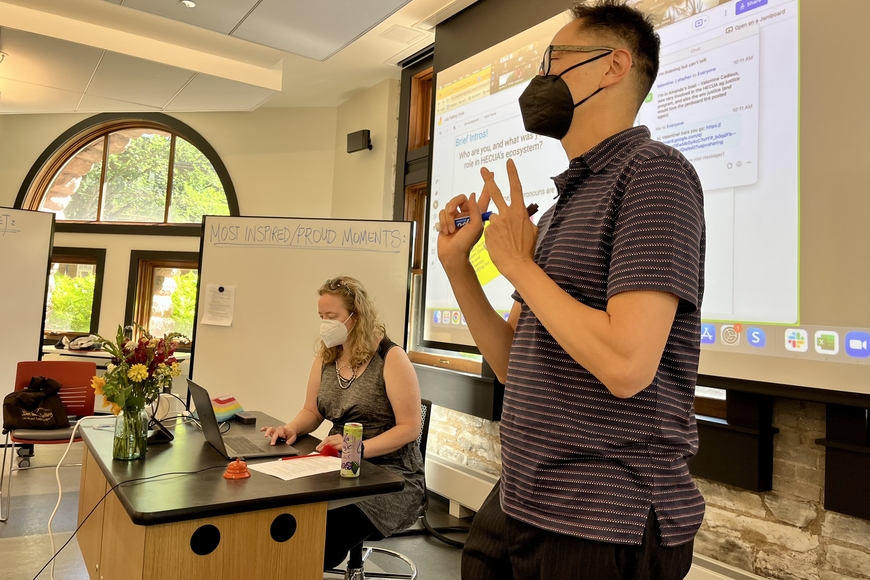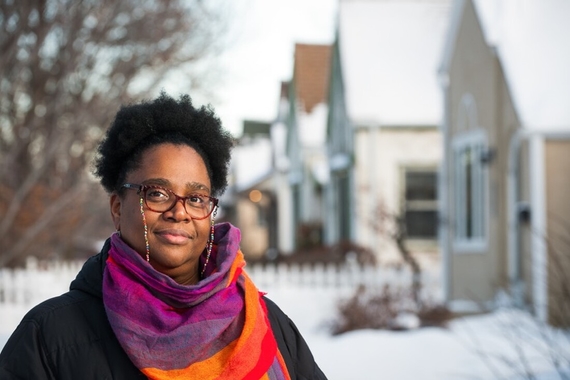Liberal Arts Connect at The Hub: Creating “Multiversity” Through Connected Learning
On December 31, 2021, the Higher Education Consortium for Urban Affairs (HECUA) disbanded due to financial difficulties during the COVID-19 pandemic. However, thanks to the effort of a few dedicated individuals, its mission to promote community-engaged social justice education lives on in Liberal Arts Connect (LAC), one of the 2022-2023 residencies at the Liberal Arts Engagement Hub.
The Origin
HECUA started in the late 1960s in response to the Plymouth Avenue civil rights uprising in North Minneapolis. A group of professors saw the need to teach experiential social change learning where it was happening: not in campus classrooms, but in the streets. Before it closed, HECUA was both a local and global nonprofit that connected college students to study abroad programs and off-campus studies. Through these opportunities, students learned about social change movements by interacting with and supporting the communities helming those movements.
Students would take a semester off to participate in internships centered around a social justice campaign of their choosing—political, social, environmental—and divide their time between classes and work for the internship. HECUA pioneered the experience-based learning approach, representing the first local organization to equate the value of education from community with the value of education from a book.
A New Generation
Today, LAC strives to continue that tradition and create a space for collaborative and engaged learning for students from all backgrounds. This Hub Residency project was initiated by four former HECUA Program Directors: Emily Anderson, Marcus Young, Emily Oliver, and Michelle Garvey.
In the effort to broaden students' definition of “valued education,” they encourage what they call multiversity. Anderson defines multiversity as “thinking about what you can do to bring out and bring together different kinds of knowledges...The wisdom people have in their lived experiences, the wisdom activists have from community work, and the wisdom scholars have from their universities.” That is the mission at LAC—to bring all of those types of diverse knowledge together.
For so long, “worthy knowledge” has been defined by what the systems in place find valuable. From the start of the education system, students receive a limited education and are taught what is and isn’t worth being curious about. But, as LAC champions, what everyone must learn is that everything is worth being curious about, and historically suppressed modes of learning are worth students’ curiosity as well.
Anderson mentions that until a few decades ago, women’s studies departments were nonexistent at universities. The content of women's studies wasn't given value until 1970, when the first women’s studies department was created at San Diego State University. From there, more colleges have opened their own departments and respected the value of previously unacknowledged types of information. At LAC, they believe these traditionally disregarded forms of knowledge have innate value, and it is only when we shine a light on what has been ignored that society can become truly and fully educated.
Anderson says, “The worst thing you can do if you’re trying to learn or produce knowledge is to close the door on what could be wisdom or knowledge.” Many of these forms of knowledge are driven by women, people of color, and LGBTQIA+ folks who have been historically ignored in white, straight, patriarchal societies. At LAC, the door is never closed.
Hope at The Hub
This group hopes to link university students with community- and academic-based learning opportunities in order to diversify their education. At The Hub, they hold what they call “talking circles” – spaces for people to speak about their experiences at HECUA and answer critical questions that surround the higher education sphere. They ask: What counts as education? What are the barriers keeping people from receiving it? At LAC, people can find like-minded thinkers and form bonds through conversations about the value of knowledge and the experiences they might not know they share. LAC also connects students to professionals to build networks in fields they are interested in.
Their hope in partnering with the University of Minnesota specifically is to offer these opportunities at a greater scope, but they also aim to see what other options are available. “The idea of multiversity is truly connected learning. You’re connected with your classmates, with the lived experiences, with academic learning. You’re connecting the University with the communities,” says Anderson.
As LAC completes its residency at The Hub, they hope to form as many connections as possible between students, the university, and other communities in the area. “We are building the plane as we fly it,” Anderson says. “This is a great opportunity to do some research with people of different educational experiences and explore what the possibilities are.”
With both The Hub as a starting point and HECUA as inspiration, LAC is changing what is defined as “worthy education” and finally opening the door for broader and more connected learning.
The Liberal Arts Engagement Hub
Liberal Arts Connect is one of five Hub Residencies for the 2022-2023 academic year. The Liberal Arts Engagement Hub seeks to facilitate reciprocal and trusting partnerships between humanistic scholars in the arts, humanities, and social sciences and the community to respond to important social challenges.
This story was written by an undergraduate student in CLA.



